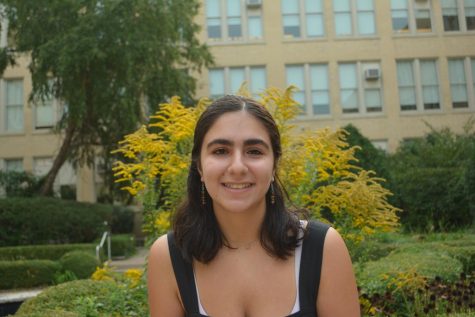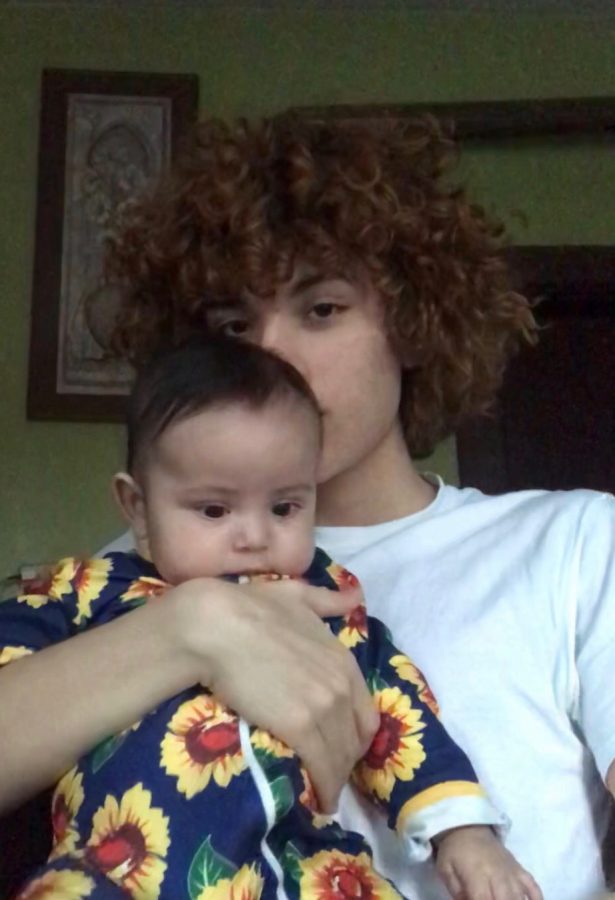Pregnancy and the pandemic within CPS
When Anna Chu, middle school science teacher at Nettelhorst Elementary School, first found out she was pregnant over the summer, she knew she had to make some changes to her life. She hunkered down in her apartment as a deadly pandemic made its way throughout the country. Gone was her social life and her days spent with her family; instead, her days became full of stress and worry about the unknown.
“We had been seeing people before I found out I was pregnant — just having socially-distanced vists,” Chu said. “My husband has really cut down a lot and I don’t see anyone outside of my family and the people at work — that’s it.”
Chu, who ended up contracting COVID-19 after the initial interview for this story on Jan. 12, said the virus has made her more tired and vulnerable to her usual pregnancy symptoms.
“We’ve been doing everything right, wearing masks, but [my husband] thinks he might have contracted it at work where everyone has been wearing masks, but who knows how,” Chu said.
She said she struggled with the fear that COVID-19 has brought.
“There is just not enough research out there about pregnancy and the Coronavirus,” Chu said.
According to the CDC, based on the information they have gathered, pregnant women are at an increased danger for severe sickness from COVID-19 when compared to people who are not pregnant. If an expectant mother does contract COVID-19, she is at risk for a premature birth. However, many of the side effects of COVID-19 while being pregnant are still unknown because of lack of research.
Another anxiety-inducing piece of information that has come out has been CPS’ reopening plans for K-8 schools on Feb. 1. After a lot of the teachers’ requests for accommodations to continue teaching remotely had been rejected, many teachers took to protest during the last weeks of January. They cited their concerns about going back to school without a vaccine on both social media and talks with CPS. However, since then, CPS has released a new plan on Feb. 10 that includes getting more teachers vaccinated and safer reforms to in-person learning.
Isela Ponce, English teacher at Lincoln Park high school, shared fears about the teachers going back to school.
“I have a lot of anxiety about my colleagues — some that I know that are back in the building and all of the ones I don’t know,” Ponce said. “If it comes to that point, I’m going to have to resign.”
Ponce says she’s been in quarantine since Feb. 14, 2020, the day she delivered her child. This is because Ponce lives with her mother, who is high-risk, so her mother can take care of her kids while Ponce and her husband work. Ponce said that without her mother’s help, she wouldn’t be able to work full time.
During the beginning of the pandemic, Chu was going into school to make video demonstrations for her students, but now she doesn’t feel safe going back in the building.
“I know that I am in this isolated bubble, but if I have eight other students in front of me, I don’t know what other precautions they’re taking,” Chu said. “That extra danger makes me really worried and makes me really not want to come back.”
Allison Jackson, science teacher at Lane, said she was in full quarantine from March (when schools shut down) until the end of June when she delivered her child. She decided to stay home for this school year with her three kids.
“It was just way too much for me to be thinking about their school — one is in kindergarten, one is in preschool, and keeping them occupied while also taking care of a newborn, so I decided to take a leave,” Jackson said. “The negatives are really outweighing the positives of coming back right now and thankfully, my husband is working full-time and we’re able to make that decision for us right now.”
Jackson and her family were extra cautious having groceries delivered and cleaning everything that was purchased before they used it. They stayed in full quarantine until June, when she delivered her child, because she feared delivering in a COVID-19 maternity ward delivery — rooms for moms with COVID-19.
“[The hospital] had a COVID maternity ward and then the recommendation is that they would take the baby from you for two weeks,” Jackson said. “That was a really scary thought to me — that I would have to be separated from my kid for two weeks right after that.”
When she went to the hospital to deliver her child, she was tested for COVID-19 to find out whether she’d be isolated in the COVID-19 maternity ward and separated from her child for the first two weeks. After her negative test result came back, she said things went pretty normally. Jackson added that she isn’t sure if the recommendations are still put in place. Recommendations seem to vary by hospital and state.
Leo Diaz, Div. 273, who lived with his sister-in-law while she was pregnant, stayed cautious at all times. More importantly for his family: making sure his sister-in-law and the baby stayed safe.
“It was just her having to be careful and the rest of us would just give her space,” Diaz said. “If she needed something — sometimes we have to help her out just like around the house.”
He also added that his family cleaned everything that came into contact with his sister-in-law and strict social distancing measures were put into place.
“All of us couldn’t go out much. [We had to] clean everything,” Diaz said. “We couldn’t see anyone outside of our direct family.”
Emily Paras, a social science teacher at Lane, delivered her child just a few days before Gov. Pritzker announced the stay-at-home order regarding the COVID-19 pandemic.
“We came home from the hospital March 11 or 12 and I remember my husband went into the grocery store to restock the fridge and the grocery store was empty,” Paras said.
But, her C-section incision ended up getting infected, which required a hospital visit during the early days of the stay-at-home order.
“I remember being so anxious about going to the doctor’s,” Paras said. “They were telling you that you were supposed to stay in and you weren’t supposed to leave the house.”
Ponce also experienced that same feeling when she had to take her newborn to her first doctor appointments.
“I was being extra cautious because this little baby is brand new and you have to take care of them and there’s just all this unknown,” Ponce said. “Being a new mother is very isolating because you’re sleep-deprived, you’re getting to know this new person, there are just so many things you’re experiencing emotionally.”
Your donations directly fund the Lane Tech student journalism program—covering essential costs like website hosting and technology not supported by our school or district. Your generosity empowers our student reporters to investigate, write, and publish impactful stories that matter to our school community.
This website is more than a publishing platform—it's an archive, a research tool, and a source of truth. Every dollar helps us preserve and grow this resource so future students can learn from and build on the work being done today.
Thank you for supporting the next generation of journalists at Lane Tech College Prep!

Mara is a senior and this is her second year with The Champion. A creator at heart, Mara loves to read and write stories. She also loves creating art and...




